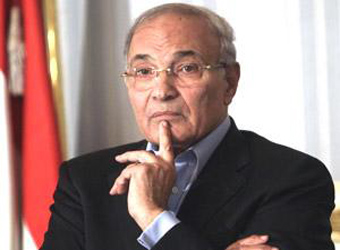One of the two finalists in Egypt’s presidential race on Sunday accused his opponent’s party of orchestrating an attack on his campaign offices, as the contest that has divided the nation took a bitter new turn.
The run-off on June 16 and 17 is the last stage in Egypt’s first free presidential election and pits Ahmed Shafik, ousted Hosni Mubarak’s last prime minister, against the Muslim Brotherhood candidate Mohamed Mursi.
Shafik, a former air force commander, on Sunday said the Brotherhood had hired thugs to carry out a raid on his headquarters in Cairo last month, when attackers set fire to storage rooms and smashed computers. 
The Brotherhood, in turn, accused Shafik of “huge lies” and said he did nothing in the last days of former President Mubarak’s rule to stop a notorious camel charge on protesters.
For those Egyptian voters who opted for centrists in the vote’s first round last month, neither candidate is particularly palatable.
Some now say they will not vote in the decider, a crucial step before the army formally hands power to a new president by July 1 in the Arab world’s most populous state.
Many have watched with frustration since last year’s revolt which ousted Mubarak at what they see as a shift back to familiar battle lines between a man they see backing Mubarak’s system and the Brotherhood, which the former president banned.
Mubarak, 84, jailed for life this month for failing to stop the killing of protesters who rose up against him, still looms large as rumours abound about his failing health.
Shafik on Sunday held a news conference in a five-star hotel on the outskirts of Cairo where he has made most public appearances since the raid on his headquarters.
“They (the Brotherhood) are insisting on using dirty methods,” he said. He also said he had complained to the election committee that mosques had been used by the group to spread their message.
The Brotherhood said in a statement Shafik had “resorted to dark campaigning tactics with the fabrication of huge lies”.
The Brotherhood has sought to portray Shafik as a throwback to the era of Mubarak, a man Shafik has described as a role model and who he served as a minister for about a decade before being appointed premier in the last days of his rule.
Days before Mubarak was driven out in February 2011, camels and horses charged demonstrators in Cairo in images that were seen round the world and which activists regarded as a last-ditch attempt to crush the protests.
The Brotherhood said Shafik was “one of the symbols” of Mubarak’s disbanded National Democratic Party, which is accused of ordering the charge. “He did not take any measures to prevent them or stop them” from charging, the statement said.
Shafik is expected to testify in court on Monday in a case about the incident. In a recent television interview, he accused the Brotherhood of inciting violence against anti-Mubarak protesters whom he said they opposed.
Mursi has described himself as a revolutionary but he has made limited progress in gaining support from centrist candidates, even though the main losers in the first round have denounced Shafik’s bid for the presidency.
Abdel Moneim Abol Fotouh, a former Brotherhood member who came fourth in the first round behind Mursi, Shafik and leftist Hamdeen Sabahy, offered Mursi guarded supported.
An aide said Abol Fotouh wanted voters to back the Brotherhood candidate, but still emphasised his political differences.
Despite opposing Shafik, Sabahy has not said he backs Mursi.
Protesters have over the past week gathered in Cairo’s Tahrir Square, the centre of the anti-Mubarak revolt, to demonstrate against Shafik whom they call the “feloul” or “remnant” of Mubarak’s regime. But many also oppose Mursi.
Activists have also protested at the court ruling against Mubarak. While the former president was jailed for life, he was spared the gallows and six senior security officials were acquitted for lack of evidence. Many people fear Mubarak could get out on appeal.
Since Mubarak was jailed on June 2, there has been increased speculation about his health.
The state news agency said his wife Suzanne and the wives of his two sons visited him on Sunday in the hospital at Cairo’s Tora prison after the “continuing deterioration of his state of health”. Mubarak’s sons are detained pending trial.


